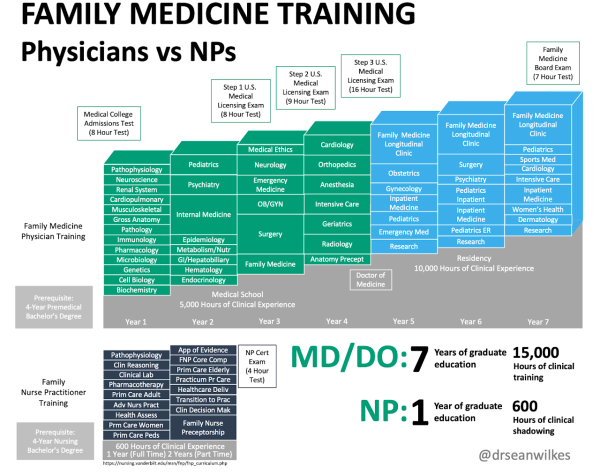You have /5 articles left.
Sign up for a free account or log in.
To the Editor:
I am writing in response to the recent article discussing the debate over who should be allowed to use the title "doctor" in the medical field ("Who Should Be Called a 'Doctor'?," Aug. 16). As a physician, I feel compelled to address some of the claims made by Jennifer Mensik Kennedy of the American Nurses Association.
Firstly, I have the utmost respect for nurse practitioners (NPs) and acknowledge the important role they play in our healthcare system. However, it is essential to clarify the significant differences in the education and training between physicians and NPs.

Ms. Mensik Kennedy's assertion that there's "not much difference" between the training primary care doctors and nurses receive in college is misleading. While both professions undergo intensive education, the depth, breadth, and duration of medical training for physicians far exceed that of NPs.
To provide a clearer perspective, some nurse practitioner programs can be completed in as little as one year of full-time graduate study, often entirely online, and require only 500 hours of clinical training in medicine. In stark contrast, medical students undergo four years of medical school, which involves both classroom instruction and clinical rotations across various specialties. This is followed by a minimum of three years of residency training, where they work up to 80 hours a week, gaining hands-on experience under the supervision of senior physicians. By the end of their training, physicians accumulate well over 10,000 clinical hours of clinical training in medicine.
The comparison between a neurologist and a family medicine physician, as mentioned by Ms. Mensik Kennedy, is also not entirely accurate. While the specialties differ, both types of physicians undergo the same foundational medical training, followed by several years-long residency programs specific to their chosen fields. The assertion that the training of a family medicine physician is comparable to that of a nurse practitioner ignores the many more years of training, extensive clinical exposure and depth of knowledge that family physicians must acquire in order to be board certified in family medicine.
In conclusion, while both physicians and NPs are essential pillars of our healthcare system, it is crucial to recognize and understand the differences in their training. Misrepresenting these differences does a disservice to both professions and, more importantly, to patients who deserve clarity when making informed decisions about their care.
Thank you for your attention to this matter. I hope this letter provides clarity to your readers and fosters a more informed discussion on the topic.
--Sean L. Wilkes, MD, MSc
Child and Adolescent Psychiatrist





